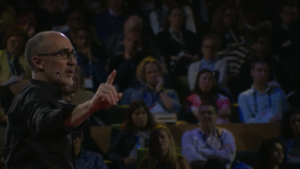 The Opening: Arthur Brooks starts off with an anecdote about his liberal background. He explains that his family has always been supportive in whatever he has chosen to do …until they thought that he had become a Republican. This leads to Arthur Brooks’ main point: the dangers of political motive asymmetry.
The Opening: Arthur Brooks starts off with an anecdote about his liberal background. He explains that his family has always been supportive in whatever he has chosen to do …until they thought that he had become a Republican. This leads to Arthur Brooks’ main point: the dangers of political motive asymmetry.
Main Points: Brooks affirms that we have been able to make great progress on eradicating poverty due to five reasons: (1) globalization, (2) free trade, (3) property rights, (4) rule of law, and (5) entrepreneurship. He goes on to say that if we want to have as much success eradicating poverty in the next decade, we need to get over the idea of political motive asymmetry–the idea that your ideology is based in love while your opponent’s ideology is based in hate. We need to learn to work together and use each other’s strengths in order to come up with the best solutions.
The Closing: Brooks concludes the talk by providing two courses of action: (1) find and listen to people who you disagree with, don’t simply tolerate them and (2) be unpredictable.
My Opinion: I chose this Ted Talk because we were tasked to find one that we disagree with. Given TED talk’s rather liberal ideology, I was finding it difficult to find one on globalization that I disagreed with. I looked for one on protectionism, but of course, there is none. It was very interesting for me to find that the very thing that had drawn me to this TED talk was the thing that Brooks’ was arguing against: constant conflict with the opposing ideology.
From my experience, Arthur Brooks is very correct in saying that society has become too polarized. And I think he also hit the nail on the head when he explained that part of this polarization is caused by the fact that we are all predictable. Whenever we talk about our ideology, we parrot what the political leaders from our parties have said. We don’t offer new insights or try to look at the situation from the other side. As a result, whenever two people disagree, they can only fight because they do not think for themselves and simply parrot without listening to the other side. I think that Brooks is correct in saying that we should have unpredictable arguments because that means that we have taken the time to understand the argument and to form our own opinion–that we have listened to the other side and considered the merits. As alt left groups push for safe spaces, I advocate for free speech and debate. If we all retreat into our political corners, the other side will only look more villainous and more tensions will ensue. As a result, less progress will be made and more countries will retreat into themselves. Studies have shown that citizens on both sides of the political spectrum have become more radical. As Brooks points out, these radically opposed ideologies is typical of countries in the Middle East with a long history of tension. If we let these tensions simmer, could we end up in the same situation as the Spain-Catalonia crisis, nearly in a state of civil war?